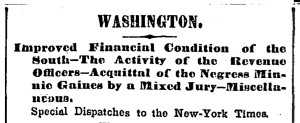Acquittal of the ‘Negress’ Minnie Gaines
A desperate black victim of domestic violence named Minnie Gaines confesses to bludgeoning the father of her unborn child– who was white. Progressives fret about whether an all-male jury will treat her fairly. The public is riveted to the scandalous news story.
If all of that sounds unfamiliar, there’s no need to ratchet up the radio or turn on the TV. Gaines went to trial in 1869. She is a part of D.C. history, yet a cursory search of the internet yields nothing about her besides the blurb to the right, from the New York Times.
Gaines’ story takes up just two pages in a new book by Kate Masur, a History professor at Northwestern University, but those two pages contain a powerful example of what Masur offers in her study of racial equality during reconstruction– “An Example for All the Land: Emancipation and the Struggle over Equality in Washington, D.C.”
When asked about the Gaines case, Masur added:
It was the first murder trial in D.C. to be heard by a racially mixed-race jury: six black men, six white. Reporters followed the jury and wrote about how they took an omnibus out to the suburbs and had a picnic on a Sunday. It was scandalous that they ate and worshiped together; the jury was breaking taboos, so the trial was a huge media event.
Women active in D.C.’s suffrage movement also attended the trial, they saw it as a feminist issue. One female activist wrote a letter to the Revolution, Elizabeth Cady Stanton’s paper, saying “Minnie Gaines is not going to get justice because she doesn’t have a jury of her peers, since there are no women on the jury.”
In the end, Gaines was found not guilty by reason of insanity. That was the mildest possible sentence and she was sent to St. Elizabeth’s Hospital for the insane for nine months, where she had her baby. Eventually, a hospital supervisor contacted Gaines’ father in Fredericksburg, Virginia and invited him to take her home.
And that is the story of Minnie Gaines.
Next week on DCentric: More on “An Example for All the Land” via an interview with Kate Masur.
-
http://flickr.com/yonas1 yonas
-
http://DCentric.org Anna John






